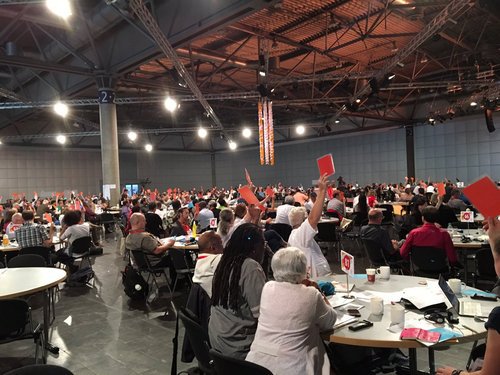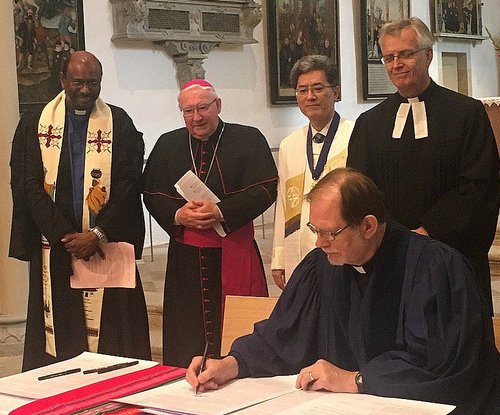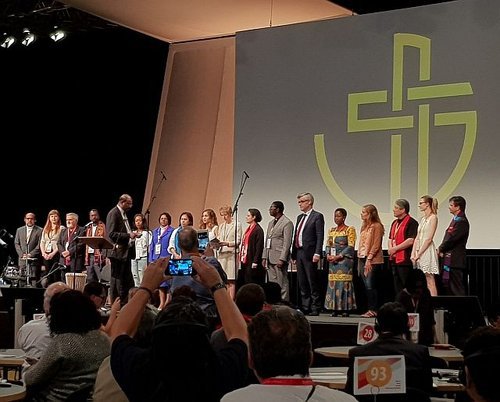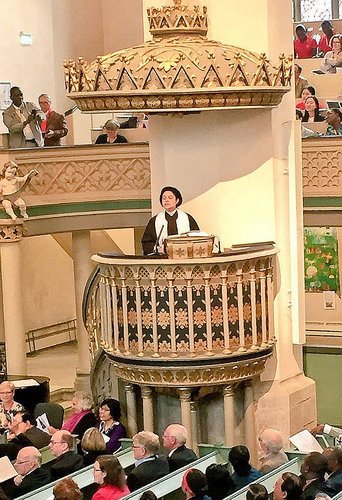Every seven years the World Communion of World Churches hosts its General Council, a gathering of reformed churches from around the world. This year’s gathering was held in Leipzig, Germany and many representatives from the RCH were in attendance.

The World Communion of World Churches’ (WCRC) General Council (GC), a gathering every seven years of reformed churches from around the world, was held this year from June 29 to July 7 in Leipzig, Germany. The WCRC is returning to the birthplace of the 16th-century Reformation, Germany, to demonstrate that the GC belongs to Christians around the world. The theme for this year’s gathering was Living God, renew and transform us, and reflects not only the WCRC’s heritage, but it also, “centers the Council around the God of Life and challenges participants to renew themselves and the church so that the world can be transformed.”
According to the WCRC, “The Reformation commemoration is for us not about theological nostalgia. It is about putting the Reformation into the present tense. This means not just the here and now; it means bringing Reformed traditions, theology and the confessing faith stance into the tense present—into the tensions, conflicts, violence, suffering, beauty, wonder and promise of this historical moment.”
Hundreds of people were in attendance at the meeting this year, including a mix of men and women, lay and clergy, young and old, to discern God’s will together through scripture in order to set the WCRC’s direction and elect new leadership to the body. A diverse group of RCH representatives were there as well, including members of national staff and those who work on a congregational level.
A diverse group of people from the RCH represented the Reformed Church in Hungary at the WCRC GC, including men and women, lay and clergy. The group includes Rev. Dr. László Gonda, Associate Professor for Mission and Ecumenical Studies at Debrecen Reformed Theological University; Rev Eszter Dani, Head of the RCH Mission Department; Rev Balázs Ódor, RCH Ecumenical Officer; Ms Szabina Sztojka, Seminary Student of Károli Gáspár University of RCH, colleague of the Mission Department; and Ms Diána Erdélyi, Ecumenical Secretary. Events for youth will precede the General Council, and RCH delegates participated in those as well. Anna Balázsfalvi-Ábrám, Secretary of the RCH Youth Office, and Adrienn Bátor attended the Global Youth Gathering of the Reformed Churches, with Ms Bátor staying on to volunteer in the Stewards Program during the GC.
In his initial report to the World Communion of Reformed Churches’ General Council, General Secretary Chris Ferguson outlined a new vision for the future, even as he noted the challenges the Communion has taken on since the 2010 Uniting General Council—and those it is still facing.
issue is never far away. “Human sexuality has been long identified as both a church-dividing and a communion-dividing issue,” he said. “The purpose is not to come to a common position on human sexuality but to strengthen our understanding of communion—taking away the power of our differences to divide us while honouring the imperative of justice.” A Consultation on Communion and Human Sexuality will be convened on this issue in November.
As for the question of justice, the WCRC has focused on equality between women and men. “Gender justice is not limited to women’s ordination. Our goal is to reach 50% of female delegates at the General Council,” said Ferguson.

Another important theme attracting attention especially in this year noting the 500th anniversary of the Reformation, is ecumenical engagement. “We will celebrate our association to the Joint Declaration on the Doctrine of Justice (JDDJ) together with ecumenical partners in the context of this Council during our day in Wittenberg on July 5. This is an important signal of our commitment to Christian unity,” said Fergson. The JDDJ, signed both by the Catholic Church and the Lutheran World Federation, states that the churches share “a single understanding of justification by the grace of God through faith in Christ.”
More widely, Chris Ferguson called for the transformation of the whole society: “As a World Communion we are all aware that our entire world—people and planet—are in a crisis that engulfs our life together in all its dimensions; politically, economically, socially, culturally, religiously, ecologically, militarily and gender equality with massive threats to life, sustainability and wellbeing. We must fight against all kinds of violence”—notably by giving a voice to the poor, by engaging with young people and children while deepening the understanding of the intersections between theology and justice, peace and reconciliation.
On the final day of the Council, the Rev. Najla Kassab, a minister in the National Evangelical Synod of Syria and Lebanon (NESSL), was elected president of the WCRC for the coming seven years. “With her experience and many gifts, Najla’s vision, insight, spiritual strength and grace make her the right person to lead us forward as president,” said Alison McDonald, the moderator of a Nominating Committee that brought a slate of nominees for the WCRC Executive Committee to its General Council.

The elections took place on 7 July, the final day of the Council. Of the 22 members of the new Executive Committee, 10 are men and 12 women; 15 are ordained and 7 are lay people. Five of the members of the Executive Committee are young adults under 30 years of age, including one of the vice-presidents.
The RCH’s own Diana Erdélyi was elected to the Executive Committee during the Council. She has been been involved with the national church office of the Reformed Church in Hungary in varying capacities since 2012. Currently, Erdélyi is the RCH’s Ecumenical Secretary and she facilitates ecumenical partnerships of the RCH on a national and international scale.
Kassab, 52, has been a member of the WCRC executive committee since 2010. The director of the Christian Education Department of NESSL, she was the first woman to receive a preaching licence in her church and, in March 2017, the second woman to be ordained. Kassab has a BA in Christian Education from the Near East School of Theology, and graduated with a Masters of Divinity from Princeton Theological Seminary (USA) in 1990.

“Since 1993 I have been struggling for women to be ordained in the Middle East, and I thank God that just two months ago two women were ordained as pastors in the Middle East,” Kassab told a press conference after her election. “I stand, as I said, for equal rights for women to fully use their talents in the life of the church and for the church to grow through the talents of women.”
Among her priorities are strengthening the regions of the WCRC and supporting young people. “This is a time to listen to them, struggle with them, hear their contribution in the life of the church,” Kassab stated.
She noted that on some issues, WCRC member churches have different views. “The priority is to sit around the table and listen to each other in a spirit of discernment and dialogue guided by the Holy Spirit.”
She underlined the importance of ecumenism in the life of the WCRC. “As Reformed people we cannot survive without ecumenism,” she said. “What happened in Wittenberg is a strong ecumenical statement of the churches.”
Article by by Laurence Villoz and Aiko Sumichan, via wcrc.ch
Edited by Kearstin Bailey